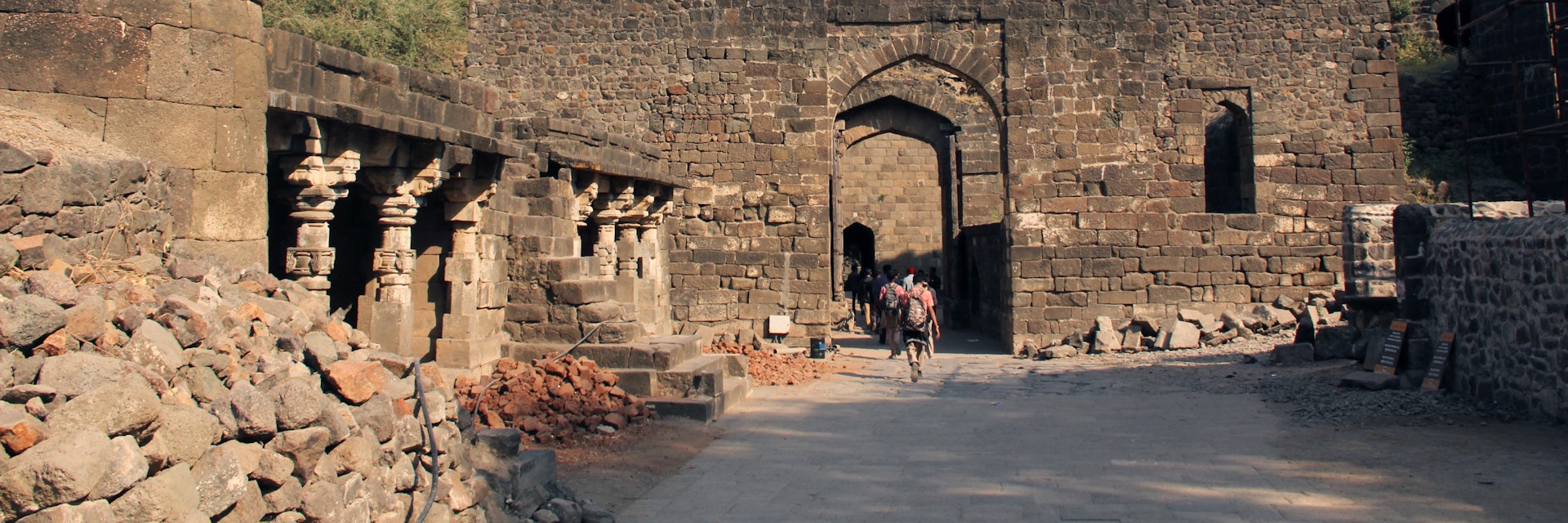No trip to Aurangabad is complete without a pit stop at the ruined but truly magnificent hilltop fortress of Daulatabad, about 15km away from town en route to Ellora, which sits atop a 200m-high craggy outcrop known as Devagiri (Hill of the Gods). A 5km battlement surrounds this ancient fort, a most beguiling structure built by the Yadava kings through the 12th century and originally conceived as an impregnable fort.
In 1328, it was renamed Daulatabad, the City of Fortune, by Delhi sultan Mohammed Tughlaq, who decided to shift his kingdomвҖҷs capital to this citadel from Delhi. Known for his eccentric ways, Tughlaq even marched the entire population of Delhi 1100km south to populate it. Ironically, Daulatabad вҖ“ despite being better positioned strategically than Delhi вҖ“ soon proved untenable as a capital due to an acute water crisis and Tughlaq forced its weary inhabitants to slope all the way back to Delhi, which had by then been reduced to a ghost town.
The climb to the summit takes about an hour, and leads past an ingenious series of defences, including multiple doorways designed with odd angles and spike-studded doors to prevent elephant charges. A tower of victory, known as the Chand Minar (Tower of the Moon), built in 1435, soars 60m above the ground to the right; itвҖҷs closed to visitors. Higher up, you can walk into the Chini Mahal, where Abul Hasan Tana Shah, king of Golconda, was held captive for 12 years before his death in 1699. Nearby, thereвҖҷs a 6m cannon, cast from five different metals and engraved with AurangzebвҖҷs name.
Part of the ascent goes through a pitch-black, bat-infested, water-seeping, spiralling tunnel. Guides (вӮ№1600 up to five people) are available near the ticket counter to show you around and their torch-bearing assistants will lead you through the dark passageway for a small tip. On the way down youвҖҷll be left to your own devices, so carry a torch.
As the fort is in ruins (with crumbling staircases and sheer drops) and involves a steep ascent, the elderly, children and those suffering from vertigo or claustrophobia will find it a tough challenge. Bring water and allow 2ВҪ hours to explore the structure.
There is little in the way of accommodation at Daulatabad вҖ“ people bed down in Aurangabad or Ellora. For meals, the entrance to the fort is swarming with dhabas (casual eateries) and fresh fruit and flavoured crushed-ice stalls.
Ellora-bound buses departing the MSRTC bus stand every half-hour (non-AC вӮ№20, 30 minutes, 5.30am to 8pm) can drop you at the entrance. The stop for buses back to Aurangabad is 500m south of the Fort entrance. Rickshaws charge вӮ№30 (sharing) or вӮ№100 back to Aurangabad.




